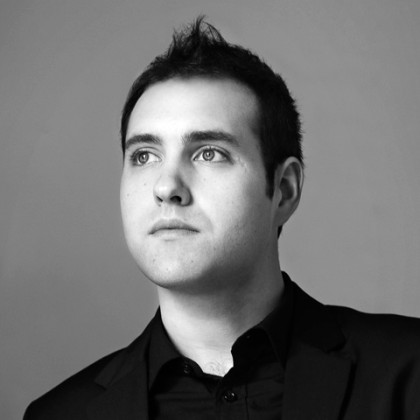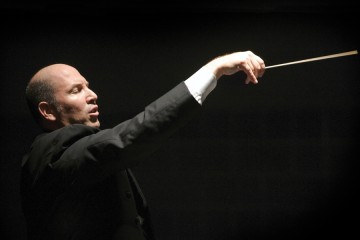Blair Skinner caught the conducting bug while sitting with the second violins in high school.

Image caption: Blair Skinner
Skinner played with the all-state orchestra based in Louisville, Kentucky, in high school and was part of the first violins as a sophomore. But the following year, he was seated with the second violins.
"I was 16 years old that year, and I distinctly remember feeling like I had been snubbed," Skinner, currently a DMA conducting candidate at the Peabody Institute, says with a laugh.
The conductor that year was Alex Jimenez, now the director of orchestral activities at Florida State University. Jimenez opened Skinner's ears and mind to understanding how every instrument fit into the orchestral whole, reminding performers that they're all there to bring the music to life.
"That really stuck with me, especially feeling like I had a lesser role at the time," Skinner says. "We were playing Wagner's Prelude to Die Meistersinger and that has one of the most glorious second violin parts I think in the literature. It couldn't have spoken to me at a better time, just to be able to investigate that music, play it, perform it, and really get a sense of what was going on because the way that [Jimenez] talked about it. The way he rehearsed opened my ears up to what was going on around me, especially sitting in the middle of the string section rather than on the outside. I could hear more woodwinds, I could hear the lower strings better, I could communicate with them better. It just became a different experience and I couldn't hear orchestral music the same after that. Seeing him at work gave me the idea that that's something I'd really like to do—to give that to other people, to open their ears up to this experience they're having and making something really beautiful."
Skinner is now the assistant conductor for the Hopkins Symphony Orchestra, which kicks off its 2017–18 season Sunday at the Bunting-Meyer Interfaith Center with a program featuring Handel's Concerto Grosso, Op. 3, No. 1; Bartók's Romanian Folk Dances; and Haydn's Symphony No. 101, "The Clock." The free concert features the HSO's more intimate Concert Orchestra, which is led by Skinner and performs smaller symphonic works and chamber pieces.
The Hub caught up with Skinner to talk about learning now to conduct and work with symphonies, and collaborating with a community orchestra such as the HSO, where he starts his third year as assistant conductor this season.
What does a graduate program in conducting entail? I imagine fair amount of conducting understanding comes from having to work with an orchestra, and it's difficult to get that many student musicians, whose schedules are always overstuffed, in one room at one time.
What a graduate program in orchestral conducting gets you is that extended exposure that you need to hone that craft. All conducting students, we've spent hours in front of a mirror checking ourselves out, making sure that looks good, making sure we've got that move down for that particular cue. We've all done it, but it doesn't really mean anything unless some other group is being affected by it and you're effectiveness is measured in the sound that you're creating with that group.
I remember feeling really confident in some of my very first conducting lessons, especially as a master's student. I had just come back from a summer festival, had some successes there, and was feeling really good about executing the technique that one teacher was trying to teach me. Then I went to Northwestern and I was working with Victor Yampolsky and he would say, in his Russian accent, so many times, "Sorry, that's not my class." That meant you were doing something that didn't look right. It didn't communicate the way he expected us to communicate.
You go through that period of learning a particular way a mentor would like to see things communicated, and you work with them for an extended period of time, and it takes something special to be able to adapt to the style and take advice of several different mentors—coming to Peabody, Gustav Meier was still alive and director of the conducting program, but we also had Marin Alsop coming in to do master classes, so you learn how to be flexible.
What they're all trying to help you do in the end and is be able to adjust to the temperamental nature of the orchestra because you're working with sometimes 80 or 100 individual personalities. [Famed German conductor] Bruno Walter was the one that said, "It feels like you're doing battle with an eight-headed beast." Conducting can feel that way sometimes, whether that be through the music and the experience of the music itself or if you're in a semi-hostile situation. I've seen it happen.
What attracted you to working with the Hopkins Symphony Orchestra?
I ran into some people that played in the Hopkins Symphony when I was living in Mount Vernon, and they have a very high opinion of [music director and conductor] Jed [Gaylin] and the programs that he picked. And I heard so many good things about it that when the job did come open, I applied as soon as I heard.
Video credit: Johns Hopkins University
I'm really glad that I did because it's a very unique experience to get to work with such a group of intelligent people. I conduct the concert orchestra and I assist Jed with the larger symphony orchestra, and we get to work with a group who all have their own unique stories of how they got involved in music. Regardless of where their passions have pulled them vocationally, intellectually, they're doing something else at Hopkins, but they still keep coming back to music and performing orchestral music. When you think about it, it's a very unique thing to see communities where orchestras just spring up. It's really something that I believe is integral to a longer cultural story of who we are as human beings.
What has working with a community orchestra such as the HSO taught you about conducting, programming, audience?
I think my biggest challenge doing these programs is that I have three concerts a year, and I really want to make sure that I'm giving the students something of substance in these concerts because they give up their weekends to participate, so I want to make it very worth their while. My first year, when we sat down to talk about the programming, Jed told me, "You know, there are a couple pieces that I'd really like you to keep on doing," and one of them was the piece that we were doing on the very last concert, Haydn's Symphony No. 104. He said, "I don't think this orchestra has ever done a Haydn symphony, at least since I've been here, and I think that's really important for the group."
Also see
When he said that, I was like, OK, this guy understands how to build an orchestra and how to teach an orchestra to think about the way a symphony is constructed. Not just the symphony as a genre of music that we're performing, but how the symphony and orchestra work together because Haydn was so integral to the development of the modern orchestra. He modernized the orchestra. He standardized it in the same way that he did with the string quartet. When you play his string quartets, you get a taste of the way he thinks about the construction of music, and it is very much what we call the classical aesthetic. The structure, the raw elements of what makes a fortress out of these monumental works of music.
I think that's really important, and I think since then I've tried to make sure that we perform at least one classical symphony every year. So from my very first year [with the HSO], we've done a wide variety of music. We've done Schubert and Beethoven and Mozart. We've done some contemporary music, some that was adapted from modern film scores, some that was written for the orchestra. And this year I wanted to go back to the roots of what we're doing. If we're participating in this act of creating symphonic music, let's take a closer look at the symphony.
So we're starting with Haydn, "The Clock" Symphony No. 101. It's one of his most mature, his most modern, and it was a huge success when he wrote it toward the end of his career, when he was very chic in London. Haydn went to London after he had given his time [as a court musician] to the Duke of Esterházy, going to his country cottage in the middle of the swamp every summer, and he was done with that. So he decided, "I'll go to London, where I can be a celebrity instead of having to play for my dinner." He was very appreciated in London, and he has been since his last symphonies were written during that time that he was very popular there.
I like this one because it has such a beautiful energy about it. He starts in D minor, it's this very melancholy, moving sort of introduction, and it doesn't last very long. Then we're off to the races with this galloping melody that he has at the beginning of the first movement. It's strange, temperamental, and sounds youthful. A brooding teenager sort of thing—so focused and distracted with melancholy, and then forgets about it and is off doing the next, new, exciting thing in life. That's what this piece feels like.
The theme and variations in the second movement are very much that way, too. They're tricky for the orchestra—we're going to have to work very hard—and then the last movement is like a song, music that you would picture words being set to. That's kind of the model that so many symphonies that were written after his have taken.
And I wanted to pair Haydn with some unlikely pieces that are maybe not so unlikely. With Bartok's Romanian Folk Dances, I thought there's this Austro-Hungarian empire connection there with Bartok and Haydn. I'm sure that Haydn was at some point exposed to some of the Hungarian dance music that was played in the region where he was going every summer to play in the court.
Also, I wanted to do a Handel concerto grosso to show the early workings of orchestral music, that these are some of the roots of the modern symphony. The concerto grosso was a strange genre because it was so nebulous; it could mean so many things in the Baroque era. Handel happened to be one composer that really capitalized on that vagueness. This is a very early work of his, and it's peculiar because it sounds largely like an orchestral work with just some very short solos from different instruments.
I also wanted to do Handel because he's another German composer that happened later in life to arrive in London and find a lot of success there, and Haydn was very influenced by that story. A lot of their music that was written at that time has a similar feel to it, I think. I think those two guys share a lot in common across generations of monumental musicians.








